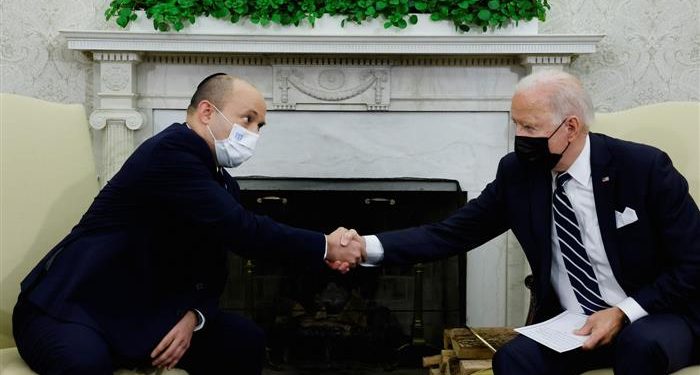Finally, US President Joe Biden could meet the new Israeli Prime Minister Naftali Bennett one-on-one for 50 minutes and then with their respective aides August 28. The meeting scheduled earlier was on the point of being shelved following the killings of scores of Afghans and 13 US army personnel by suicide-bombers at Kabul airport. It was held after getting postponed by two days and all the items on the agenda were covered. The most important issue was the US-Iran nuclear deal to which Israel is hyper-allergic, the Israel-Palestinian conflict and the Israel-China ties which is a sore point with the USA.
But, the first meeting between the US President and the Israeli Prime Minister turned out to be only a tone-setter, nothing more, nothing less. This was only expected. Bennett needed to silence his critics belonging to the camp of the just ousted Israeli Prime Minister Benjamin Netanyahu by showing to them that he could evolve a workable relationship with the new US President, who had never before met him, but had an excellent relationship for years with Netanyahu. In fact, the latter’s supporters were euphoric when the announcement postponing the meeting was made, while Bennett and his entourage were cooped up in their hotel in the USA. As for Biden, he is in no mood to oblige Israel by torpedoing the restart of the US-Iran nuclear deal progressing fast despite strong opposition to it by both Bennett and his immediate predecessor. Nor was the Israeli Prime Minister prepared to sour his country’s hugely profitable economic relationship with China even though the Biden administration has made hostility towards China and Russia the linchpin of the US foreign policy.
Both the US President and Israeli Prime Minister are now facing great challenges at home. It is, therefore, natural that they would avoid political surprises and fulmination in public that may disturb the special relationship the two countries have had for years. This is probably why the public statements they made after the meeting were bereft of any dramatic announcements and instead they reflected a sobriety of approach to the contentious issues.
Biden is in a soup over Afghanistan and Bennett suffers from a credibility crisis having won just 6 per cent of the votes in the last elections. Still, there might be more behind-the-scene disagreement when they were closeted together for 50 minutes without their aides. No one knows what transpired between the two, but their statements do indicate that they had decided to put up a brave front that their stated positions have been mutually appreciated and they remain unchanged.
Biden’s concern was how to push Bennett to abandon Israel’s cooperation with China, mainly in the hi-tech sphere. The Biden administration is focused on its greatest strategic challenge being posed by China, which has been exploiting US blunders in Afghanistan and Iraq and expanding its influence with lightning speed in the Middle East, Asia and beyond. What causes dismay to the US is China’s investment in Israel that has exceeded $19bn in the past 18 years, including $9bn in technology. Their bilateral trade reached $17.5bn last year.
If Biden was unable to persuade Bennett to delink Israel from China, he had the Iran card to play to make Israel see the US point of view. For one thing, Tehran is a party to the Non-Proliferation Treaty (NPT) and its nuclear programme remains largely peaceful, while Israel refuses to join the NPT and is the only nuclear military power in the Middle East. Biden’s statement after the meeting clearly indicated the talks between them centered around this logic. Not only did he not give even the slightest hint that the USA was reconsidering its position on restarting the nuke-deal with Iran, but said, instead, the USA would first use diplomacy to rein in Iran’s ambition of developing nuclear weapons with the enriched uranium it would obtain from the USA. Only when diplomacy fails, the USA would think of using ‘other options.’ It is easily understood the USA would think twice before looking for a military solution after its disastrous Afghan policy. For now, Bennett is happy with the US President’s promise of harsher measures against Iran should the latter abuse the nuke deal. This also makes room for Israel’s unilateral actions against Iran should such a situation arise. This is some gain for Bennett who can now boast before his critics at home that he hasn’t returned from Washington empty-handed. He has the US President’s pledge to resort to ‘other options’ against an errant Iran.
As for the establishment of a Palestinian state, Bennett had told the US press before the meeting that Israel won’t make it a reality, reversing Israel’s stated position. The controversial statement seemingly did not figure in the meeting. The Afghan crisis has rattled Biden so much that he might have deliberately decided not to further muddy the already muddied Israel-Palestine issue. Bennett should feel happy over the turn of events since his public statement did not attract official response from the US.
The meeting, therefore, achieved the main purpose of resetting the relationship between the two countries under the two new leaders. This was reflected in Biden’s remark after the meeting when he said, “We’ve become close friends,” even though he’d just met Bennett for the first time about an hour earlier.






































